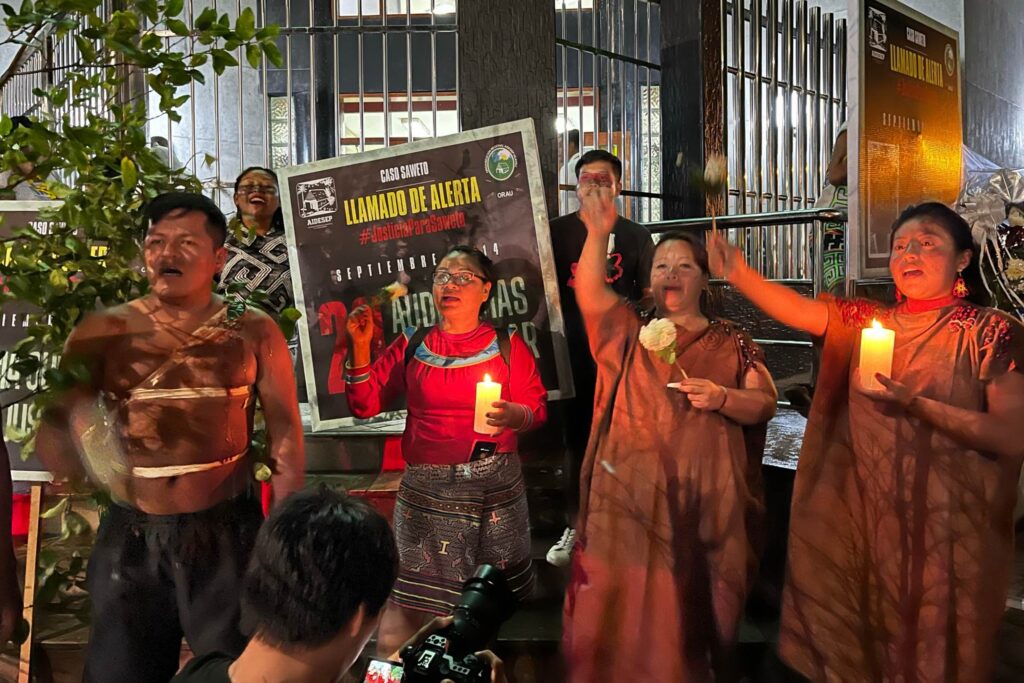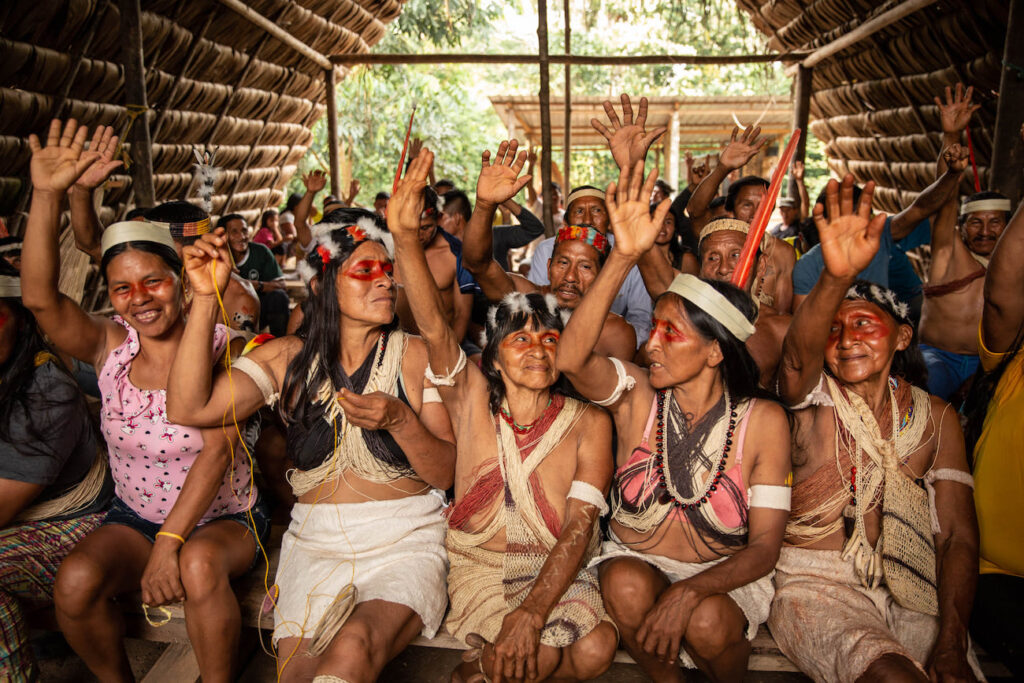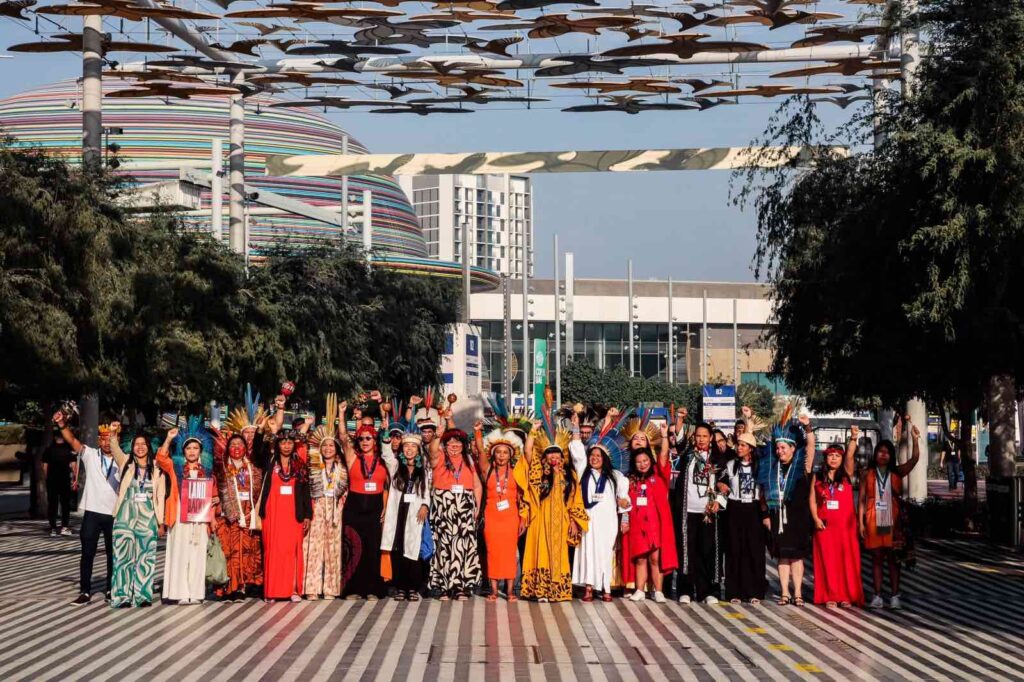Indigenous leaders and allies advocating for climate justice during COP27 at Sharm El-Sheikh, Egypt.
IMAGE CREDIT: Global Alliance of Territorial Communities (GATC)
The year 2023 marked a disturbing milestone as the hottest year ever recorded. For the first time, the average global temperature exceeded pre-industrial levels by 1.5ºC, bringing the world scarily close to breaching the critical threshold outlined in the Paris Agreement. As we witness extreme weather events—from heat waves to droughts, and from flooding to rising sea levels—the urgency to act has never been clearer. The effects of climate change are no longer distant warnings; they’re here. We must stand united and vigilant, continuing to advocate for change in the face of climate despair. As we step into 2024, we are keeping our eyes on these six topics as a source of ongoing determination:
1. Phasing Down Fossil Fuels

During the most recent Conference of the Parties to the United Nations Framework Convention on Climate Change (COP28), world governments took a historical step in acknowledging “fossil fuels” for the first time, agreeing to work together to “transition away from fossil fuels” and ensure net-zero emissions by 2050. While hailed as progress, the choice of “phase down” over “phase out” stirred debate, with many climate activists calling it too little, too late. The influence of the fossil fuel industry during COPs also raised important concerns about the future of the summits.
Additionally, there is the glaring contradiction of those governments who commit to reducing fossil fuels while simultaneously opening new oil drilling ventures. Just one day after COP28 concluded, the Brazilian government auctioned off drilling rights in 602 areas, including 21 new sites in the Amazon basin. And in the United States, the Biden administration continues to expand oil and gas production.
While global negotiations to protect our planet are notoriously challenging, we must acknowledge that the recent developments, though not sufficient, are a step forward. It is crucial that governments are held accountable for their promises.
2. The Future of Carbon Markets
Carbon markets, integral to the Paris Agreement, are presented as a tool for achieving global climate goals and reducing emissions through the trading of carbon credits. The credits can be issued for a variety of activities, including forest conservation. Approximately 36% of the world’s remaining primary forests and at least 24% of the above-ground carbon in tropical forests are located within Indigenous peoples’ territories.
However, forest carbon markets have encountered resistance from some Indigenous peoples, who perceive them as a potential threat to their rights. Critics at COP28 voiced concerns about the role of Indigenous peoples in these markets, and the 2023 sale of jurisdictional carbon credits in Guyana set a worrying precedent, with irregularities in the consultation process and a lack of transparency on behalf of the government and certifying bodies regarding the use of Indigenous peoples’ lands, among other concerns.
As global carbon markets expand in 2024, robust mechanisms respecting Indigenous peoples’ rights must be established. Without clear safeguards, these markets risk undermining the land rights of the world’s most effective forest guardians. Our partners at the Mesoamerican Alliance of Peoples and Forests have set forth a roadmap for how to improve the integrity of jurisdictional REDD+ transactions in regards to Indigenous peoples’ rights. And Rainforest
Foundation US (RFUS) is committed to advocacy efforts that will foster respectful dialogue and collaboration between governing bodies and Indigenous rightsholders.
3. Protection of Environmental Defenders

Defending the environment remains perilous, especially for Indigenous communities. A shocking report revealed that 1,910 environmental activists were killed globally from 2012 to 2022. The vast majority of these deaths, about 90%, occurred in Latin America. Though Indigenous peoples represent only 5% of the global population, they accounted for a third of these victims.
In Latin America and the Caribbean, groundbreaking initiatives like the Escazú Agreement—the first international treaty to explicitly include protections for environmental defenders—have been proposed to reinforce the rule of law, environmental protection, and human rights in the region. However, some countries, including Peru, Brazil, and Colombia, have yet to ratify it due to concerns about sovereignty, legal uncertainties, and business interests.
The 2014 Saweto case in Peru, where four Indigenous leaders were brutally murdered for defending their territory from illegal loggers, exemplifies the extreme risks environmental defenders face. The outcome of the case—which finally went to trial in 2022—holds profound implications for environmental defenders across the region. With the final verdict expected in the coming weeks, Peruvian courts have the opportunity to set a historic and important precedent by holding both the triggermen and the corporate masterminds accountable for the murders.
4. The Power of Democracy

2023 marked two pivotal moments for environmental democracy in the Americas. In response to mass protests last fall, the Supreme Court of Panama ruled against a permit for Central America’s largest copper mine. Meanwhile, Ecuadorian voters made history by choosing to leave oil in the ground in favor of protecting Yasuní, one of the most biodiverse regions on the planet.
These wins serve as crucial reminders to empower communities globally through active participation and solidarity with Indigenous groups in the pursuit of a sustainable future. Environmental democracy is a critical way to redistribute power around how natural resources are used, and its effectiveness will only grow as more of us get involved.
With 2024 being a significant electoral year—more than 50 countries are due to hold national elections—it presents an opportunity to make your voice heard and your vote count. This is a pivotal time to stay informed, be vocal, engage in peaceful demonstrations, and stand in solidarity with Indigenous peoples.
5. Pledges to End Deforestation by 2030
Despite pledges at COP26 to halt deforestation by 2030, global deforestation actually increased by 4% in 2022. Still, important signs of progress are there if you look for them. Brazil, accounting for around 30% of the world’s deforestation, has seen a significant turnaround over the past year with a new government committed to fighting deforestation.
The loss of primary forests in tropical regions remains a significant challenge in the fight against the climate crisis. It’s crucial to recognize that this devastation is often fueled by consumption patterns in wealthier nations, particularly in the Global North.
In response to this issue, the European Union passed a law requiring producers to prove that their supply chains are free from deforestation. The United States introduced a similar initiative, the FOREST Act of 2023, which seeks to prohibit imports of commodities produced on illegally deforested land.
While some Latin American leaders have raised concerns that these measures may disproportionately affect small farmers and shift deforestation to less protected areas, the situation underscores the complex trade-off between environmental protection and economic growth for tropical forest countries.
6. Indigenous Peoples Lead the Way

Indigenous peoples, the planet’s most effective forest guardians, have only recently seen their conservation efforts gain the recognition they deserve. This shift is reshaping traditional narratives on environmental protection and bringing Indigenous voices to the forefront.
A 2023 report revealed that forests managed by Indigenous peoples (IPs) in the Amazon were strong net carbon sinks; those not managed by IPs showed greater levels of deforestation and were more likely to become net carbon sources. Beyond the Amazon, global research indicates that forests under Indigenous and local management are not only richer in biodiversity but also better at carbon storage, thus contributing positively to climate change mitigation.
However, challenges persist. Two significant challenges faced by Indigenous peoples include access to financial resources and legal recognition of their ancestral lands. Efforts to address the first of these challenges are underway through Indigenous-led direct financing mechanisms like the Shandia platform of the Global Alliance of Territorial Communities, and the Mesoamerican Territorial Fund. And integrated initiatives to secure land titles in Peru are also showing great promise in securing land rights. Integrating direct community finance with land rights is essential for sustaining Indigenous communities’ vital role in protecting our planet.
As we chart our course through 2024, we will continue to stand in solidarity with our Indigenous partners, determined to build an equitable and sustainable future.








